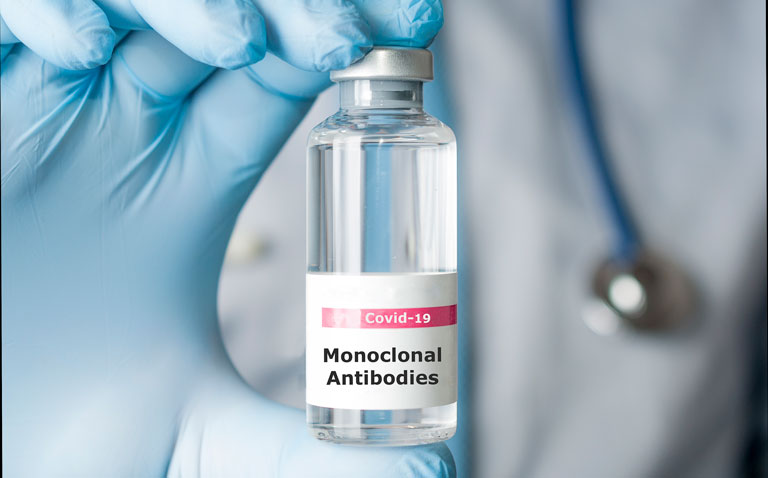Casirivimab and imdevimab in combination have been found to reduce the development of symptomatic COVID-19 over 28 days compared with placebo
Casirivimab and imdevimab used together lead to a significant reduction in the proportion of patients who develop symptomatic COVID-19 compared to those given placebo. This was the conclusion of a randomised trial by researchers from the manufacturer of the combination, Regeneron Pharmaceuticals, New York, US.
Although the arrival of effective COVID-19 vaccines have been shown to boost individuals’ immunity against the virus, therapy with monoclonal antibodies remains an alternative for those who develop an inadequate response to vaccination.
However, a recent Cochrane systematic review of monoclonal antibody therapy in COVID-19, concluded that ‘our certainty in the evidence for all non‐hospitalised individuals is low, and for hospitalised individuals is very low to moderate. We consider the current evidence insufficient to draw meaningful conclusions regarding treatment with SARS‐CoV‐2‐neutralising mAbs‘ (monoclonal antibodies).
Casirivimab and imdevimab are two mAbs that bind to different parts of the spike protein present on the surface of COVID-19. Furthermore, trial data has revealed how this combination reduced the risk of COVID-19–related hospitalisation and all-cause mortality, as well as resolving symptoms and decreasing viral load, more quickly than placebo.
The Regeneron Pharmaceuticals team undertook a two phase study of their combination. In part A, casirivimab and Imdevimab were found to prevent both symptomatic and asymptomatic COVID-19 infection among previously uninfected household contacts of infected individuals.
The present study relates to part B of their trial, in which asymptomatic, infected close contacts were treated with subcutaneous casirivimab and imdevimab.
Part B was a randomised, double-blind, Phase III trial, designed to determine whether subcutaneous casirivimab and imdevimab could prevent progression from asymptomatic to symptomatic infection.
Enrolled participants were adults with a PCR confirmed COVID-19 infection, identified within 96 hours of another household contact testing positive. Included participants were then randomised 1:1 to casirivimab and imdevimab or placebo and the primary endpoint of the trial was the proportion of individuals who developed signs and symptoms of COVID-19 within 14 days of their positive PCR result and this was reviewed over a 28 day period following randomisation.
Findings
A total of 314 individuals with a mean age of 41 years (51.6% female) were included of whom, 204 (66%) were asymptomatic and randomised to either casirivimab and Imdevimab (100) or placebo.
Among asymptomatic individuals assigned to treatment, 29% became symptomatic compared to 42.3% of those given placebo (odds ratio, OR = 0.54, 95% CI 0.30 – 0.97, p = 0.04).
Participants on treatment also experienced a 5.6 day reduction in the mean duration of symptoms compared to placebo and the total number of weeks with a high viral load was significantly reduced (489.9 weeks vs 811.9 weeks per 1000 participants, treatment vs placebo, p = 0.01).
The authors concluded that treatment with casirivimab and imdevimab for asymptomatic COVID-19 positive individuals living with an infected household contact, significantly reduced the incidence of symptomatic infection over a period of 28 days.
Citation
O’Brien MP et al. Effect of Subcutaneous Casirivimab and Imdevimab Antibody Combination vs Placebo on Development of Symptomatic COVID-19 in Early Asymptomatic SARS-CoV-2 Infection. A Randomized Clinical Trial JAMA 2022.










